by emma | Dec 23, 2008 | Africa, Social Justice
Late last month a new parliamentary report titled ‘Justice, Impunity, and Sexual Violence in Eastern Democratic Republic of Congo’ was launched in London. A few of my gapper colleagues attended the launch, and Kevin kindly wrote a little Ctrl.Alt.Shift-esque report for us. The facts can seem a little overwhelming at times, yet it will hopefully give us more of a grasp of what is happening in this beautiful country, and give us some mechanisms to engage with the issues…
– – – –
If you have hours:
Read the report into ‘Justice, Impunity, and Sexual Violence in Eastern Democratic Republic of Congo’:
http://www.appggreatlakes.org/images/stories/APPGReports/9%20october%20drc%20mission%20report.pdf
Read DFID’s Country Plan for the Democratic Republic of Congo:
http://www.dfid.gov.uk/pubs/files/DRC-countryplan08-10.pdf
If you have minutes:
Read my [Kevin’s] article about the event on Ctrl.Alt.Shift:
http://www.ctrlaltshift.co.uk/#/Magazine/article/425
Read pages 4-8 of the report, which is the Executive Summary and the Summary of Recommendations:
http://www.appggreatlakes.org/images/stories/APPGReports/9%20october%20drc%20mission%20report.pdf
If you have seconds:
Consider these facts and stats:
*Women in the Democratic Republic of Congo who have been raped during war are being imprisoned for aborting their resulting pregnancies, and then being left to starve in overcrowded cells.*
*The budget for each prisoner currently being held by the DRC government is $6 per year. Starvation is common, so naturally so is bribing or breaking your way out of jail*
*Although damage awards for military crimes totalling $1.5 million have been awarded, not a single penny has ever been paid. The entire budget for damage awards is just $5,000.*
– – – –
You can always check out our blog, Congolese Dawn, to read about some of our experiences while were in the DRC.
by emma | Dec 3, 2008 | Social Justice
 I got the opportunity to attend the inaugural Magnus Magnusson lecture on Monday, at Glasgow Caledonian university, which was given by Professor Muhammad Yunus.
I got the opportunity to attend the inaugural Magnus Magnusson lecture on Monday, at Glasgow Caledonian university, which was given by Professor Muhammad Yunus.
Yunus, founder of the Grameen Bank and dubbed “Banker to the Poor”, is recognised as one of the world’s greatest social entrepreneurs. He was awarded a Nobel Peace prize in 2006 for his efforts to create a world free of poverty by developing the concept of micro-credit, which supports entrepreneurs who are too poor to qualify for traditional bank loans. By providing small loans on suitable terms Yunus and Grameen Bank have shown that with the right support even the poorest of the poor can work to bring about their own social and economic advancement.
His lecture on Monday was titled “Alleviating Poverty: Microcredit & Social Business”. I made a minimal amount of notes, but here they are all the same…
“Peel off the layers of fear…”
Grameen Bank works with 97% women.
Looked at how conventional banks did it, then did the exact opposite.
Poverty is created by the systems that we built.
Bonsai tree example – stays small because it’s planted in a pot, fills the space its given to grow in.
Charity money has only one life – investing in social business has many lives.
Poverty belongs in the museums.
The time is now.
The greatest crisis is the greatest opportunity.
Integrated crises – we can’t ignore the current food crisis just because it isn’t affecting us while the financial crisis is.
by emma | Nov 25, 2008 | Africa, Social Justice, Travel
Just over 2 weeks ago I was in the DR Congo with the rest of the Christian Aid gap year volunteers, visiting some of our partners there. We got to meet a lot of incredibly inspiring people, people who do an awful lot of good with limited resources. One of those partners we meet was Vorsi Congo, a community organization that works through the church to combat AIDS.
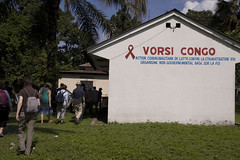
They travel across the whole country, training religious leaders, who in turn get their religious communities talking about the issues, often for the first time. Rodger, the technical director, estimated that across the 11 provinces of the DRC, their message has reached about 8million people. They try to break down the stigma surrounding HIV using mediums such as song & drama.
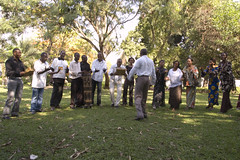
“Before, if you were HIV positive, no-one wanted to sit in the same pew as you at church. Now people are more happy to sit with them & even take communion with them.”
[Rodger]
I meet Nadine when we visited Vorsi Congo. She is the pastor of a church, and also is a woman living with HIV.
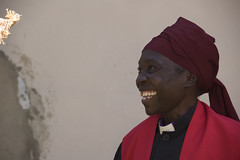
At one point as she shared her story with us, she said, “If I hadn’t have worked with Vorsi Congo, I’d be buried.” It really is a matter of life and death for people. The level of stigma surrounding HIV is still massive, and though Nadine is doing well, there are many people who have been shunned by their families and their churches when they find out they are HIV+.
We use this phrase a lot at Christian Aid, about ‘living positively with HIV’, and it’s only after meeting Nadine that I’m starting to understand what that really means. Nadine doesn’t sit around feeling sorry for herself, but instead she’s throwing herself into being a part of the solution. She’s using her story and her position in the church to help educate people.
To find out more about the issues surrounding HIV/AIDS, visit our website here.
To support our DR Congo crisis appeal , click here.
by emma | Nov 20, 2008 | Africa, Social Justice
It would appear that I’m starting to make the rounds in regional media, about my trip to the DRC with Christian Aid…
There’s an article on Scottish Christian here, and I’ve just finished an interview with the Ballymena Times.
I promise I’ll start sharing some stories here soon…!
by emma | Oct 22, 2008 | Africa, Social Justice
Tonight I had my heart broken again.
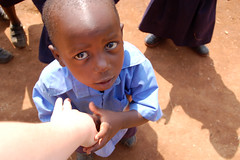
I finally got to see the Invisible Children movie tonight. They’ve just launched their IC Europe efforts properly, and are doing a tour around the UK screening the movie in as many places as possible. (If you want to host a screening click here… Ami will help, she’s lovely!) Invisible Children are working in Northern Uganda trying to counter the effects of a drawn-out civil war.
I didn’t get a chance to go to Gulu when I was in Uganda this summer, but I did get to have dinner in Kampala with my friend Jess, who interned as the IC photographer all summer. We shared stories of our summers over some food and Stoney.
I miss Uganda.
There is this scene towards the end of the movie, where a young Uganda boy who has shared his story over the course of the movie, speaks to the guys, saying,
“Don’t forget us. Watch this video a month later, and remember us. Please don’t forget us.”
I threw myself back into this hectic UK lifestyle. A new job. Flitting between multiple cities. Working full time for the first time. Not being a student. Stress. Confusion.
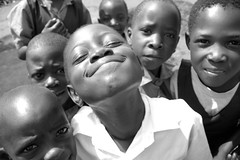
Earlier this week I finally took all the video from my trip summer past off my camcorder and put it onto my hard drive. I watched back through the most of it, for the first time since I came back. The smiling kids. The devoted staff. The passionate teams.
Watch this, and remember us.
There are so many stories and sometimes I feel overwhelmed by them. I guess I feel a little compassion fatigue at the minute. All the stories from my summer in Uganda, Rwanda, Kenya. On Saturday I am heading to DR Congo for two weeks. More stories to tell.
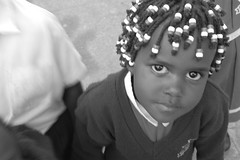
I’m not sure how much my heart can take.
It’s a good thing that it doesn’t just stay in my heart, but overflows to you all.
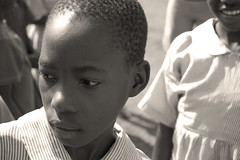
“… Break my heart for what breaks yours // Everything I am for your kingdoms cause…”
by emma | Oct 21, 2008 | Social Justice
A few weekends ago I was at a climate change coference organised by the Edinburgh Climate Network. It was really well put together, and I blogged my notes shortly after it. I thought I’d do a little tidy-up post to give you links to them all in one, easily accessible place.
Pre-Conference: Edinburgh Climate Change Conference
Session One: Climate Change: The Evidence & The Options
Session Two: Creation Care: Theology & Practice
Workshop One: Food & Climate Change
Session Three: Why & How (Not) To Care For The Climate
Session Four: Scottish & Global Perspectives
Closing Thoughts: Climate Change: Moving Forward









Recent Comments